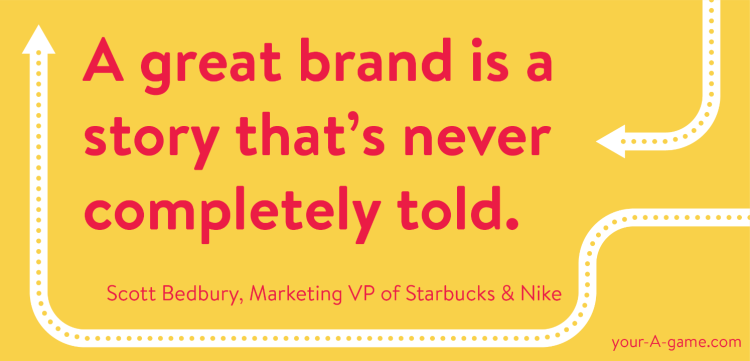One-size-fits-all only applies to cheap, synthetic, disposable items that are strictly mass produced and off the rack. Your brand is unique and will stick to you for the duration of your career.
A well-crafted brand establishes your authenticity and authority. What specific emotions and expectations should your name and work evoke? What distinguishes you from other people working in your genre? How can you consistently transcend reader expectations?
As a starting point, let’s establish a measure of success for your brand that speaks to your distinct circumstances and career. Take a hard look at the following core concepts:
- PRECISION: Identify what makes you exceptional. What unique matrix of strengths and skills net you and your work the attention you deserve?
- PURPOSE: Specify how you want to position yourself within your genre. What matters to you? What do you want to be known for?
- PASSION: Consider your needs, interests, and passions. What are your objectives, and how can your brand help you achieve them?
Drill down past the first, glib responses to get at the spark that makes all this work seem not just worthwhile but exhilarating. If you cannot find real joy in the work expected of you, you will never be able to maintain it long enough to succeed.

Brand Buy-ology
We like to think of ourselves as rational creatures, but cognitive research indicates most of our decisions are instinctive and emotional. According to neuroscientist Antonio Damasio, “It is emotion that allows you to mark things as good, bad or indifferent.”[i] Or as he says elsewhere, “We are not thinking machines. We are feeling machines that think.”[ii] Brands coopt brain biology to direct attention by appealing to urges, not logic.
In his book Unconscious Branding, Douglas Van Praet points out that “feeling drives behavior… We don’t really have free will but rather free won’t. We can apply the brakes of restraints to the forces of feeling, but we can also fall short of stopping in time.”[iii] Our challenge then is to stimulate those forces.
Brands win by appealing to atavistic urges, our primal instincts to fight, flight, breed and feed. Or as Van Praet calls them, “survival, safety, security, sustenance, sex, and status.”[iv] What fundamental appetites can your brand satisfy? The more core drives you can provoke, the better.
Strong brands carve electrochemical shortcuts which steer our decisions before we’re consciously involved. By laying the groundwork in advance, positive brand associations turn urges into purchases. Van Praet delineates this process in seven steps:[v]
Disrupt patterns: draw attention to your brand by breaking through the habits and white noise clogging the bandwidth of public consciousness.
- Get in sync: signal to potential readers that you’re on the same page and speak their language.
- Envision possibility: dazzle them with a clean, compelling picture of the benefits you can imagine and offer them.
- Create powerful emotions: evoke strong feelings that connect people to your work and connect readers to each other.
- Prove your claims: substantiate promises with proof. Emotions come first, but evidence will convince the rational mind to give in to impulses.
- Hardwire associations: prime readers for a certain experience with coherence and consistency. Resonant repetition rewires the way their brains perceive your work.
- Offer action: give people easy ways to connect with the brand directly. Personal engagement reinforces the emotions and associations you represent.
By harnessing basic impulses, powerful branding can hardwire public perception and steer new customers towards you unconsciously. Forge those neural links in the popular imagination, and over time, your brand will become an unconscious force that puts your work in the right hands without you needing to interfere.
© 2016 Damon Suede & Heidi Cullinan, All Rights Reserved
- [i] Antonio Damasio, “When Emotions Make Decisions.” The Aspen Institute (4 July 2009).
- [ii] Antonio Damasio, “What Role Do Emotions Play in Consciousness?” The Aspen Institute, 10 November 2010. See also his Descartes' Error: Emotion, Reason, and the Human Brain and Self Comes to Mind: Constructing the Conscious Brain
- [iii] Douglas Van Praet, Unconscious Branding, p 65.
- [iv] c.f. Douglas Van Praet, Unconscious Branding, p 59. Van Praet goes into great detail about the way various ad campaigns and market strategies use blends and hybrids of these six basic drives to spread virally.
- [v] c.f. Douglas Van Praet, Unconscious Branding, specifically discussed and analyzed on pp 89-244. The entire book is truly worth a close read to unpack Mr. Van Praet’s ideas.

